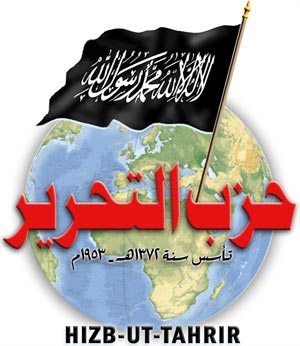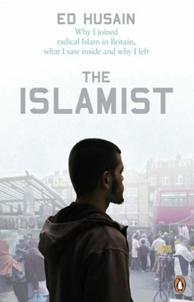Related Research Articles

Hizb ut-Tahrir is an international pan-Islamist and Islamic fundamentalist political organization whose stated aim is the re-establishment of the Islamic caliphate to unite the Muslim community and implement sharia globally.

Muhammad Taqi al-Din bin Ibrahim bin Mustafa bin Isma'il bin Yusuf al-Nabhani was an Islamic scholar from Jerusalem who founded the Islamist political party Hizb ut-Tahrir.
Akromiya is an Islamist organization founded by Akrom Yo‘ldoshev.
HTB may refer to:
Zeyno Baran is a Turkish American scholar on issues ranging from US-Turkey relations to Islamist ideology to energy security in Europe and Asia. She was the Director of the Center for Eurasian Policy and a Senior Fellow at the Hudson Institute, a think tank based in Washington, D.C. From January 2003 until joining the Hudson Institute in April 2006, she worked as the Director of International Security and Energy Programs for The Nixon Center. Baran also worked as the Director of the Caucasus Project at the Center for Strategic and International Studies from 1999 until December 2002.
Hizb-an-Nusra is an Islamist organization which the Uzbek government considers to be terrorist in nature that has operated in Uzbekistan since 1999. It was founded by Mirzazhanov Atoyevich. Members of Hizb ut-Tahrir, an international organization dedicated to establishing a unified Islamic state across the Muslim world, created Hizb-an-Nusra in Tashkent out of dissatisfaction with Hizb ut-Tahrir's inability to overthrow the Government of Uzbekistan.
Hizb Waed is an Islamist organization that split off from Hizb ut-Tahrir. It is led by Muhammad Showeiki.
Terrorism in Tajikistan stems largely from the forces of the political opposition who opposed the comprehensive peace agreement that ended the civil war in 1997. President Emomali Rahmonov and UTO leader Said Abdullah Nuri signed the agreement on 27 June, believing it would bring an end to hostilities. However, dissident Islamist militants led by Tohir Yo‘ldosh and Juma Namangani formed the Islamic Movement of Uzbekistan in 1998, allying with Al-Qaeda and vowing to unite Central Asia as an Islamic state. The latest terror attacks took place in the Qabodiyon District on November 6, 2019, when a policeman and a border guard were killed by several Islamic State militants. 15 terrorists were also killed.
Terrorism in Kyrgyzstan has increased since the U.S. military invaded Afghanistan and overthrew the Taliban in 2001. The governments of Kyrgyzstan and Uzbekistan provided airbases for counter-terrorism operations. Southern Kyrgyzstan is increasingly sympathetic to terrorism and Islamic extremism.
Igor Rotar is a Russian journalist. From 2003 to early 2007 he was the Central Asian news correspondent for Forum 18, a human rights organization based in Norway that promotes religious freedom. He is a Russian citizen.
Wassim Doureihi is a prominent member of Hizb ut-Tahrir (Australia), a global Islamic political party that advocates the re-establishment of the Caliphate in the Muslim world. He is a spokesman for the organisation.
Mirzazhanov Sharipzhon Atoyevich is the founder of Hizb-an-Nusra, a militant Islamist organization that advocates the violent overthrow of all Central Asian governments and replacing them with a Central Asian caliphate. He is a former member of Hizb ut-Tahrir, an international Islamist organization.

The Islamist: Why I Joined Radical Islam in Britain, What I Saw Inside and Why I Left is a 2007 book about Ed Husain's five years as an Islamist. The book has been described as "as much a memoir of personal struggle and inner growth as it is a report on a new type of extremism." The son of pious Muslim parents from South Asia, living in East London, Husain joins the Islamist group Young Muslim Organization at the age of sixteen, before moving on to be active in Hizb ut-Tahrir while in college. After disheartening experiences with factional infighting and sectarian violence at his college, and unIslamic behavior while living in Saudi Arabia as an English teacher, Husain rejects political Islam and returns to "normal" life and his family. Husain describes his book as explaining "the appeal of extremist thought, how fanatics penetrate Muslim communities and the truth behind their agenda of subverting the West and moderate Islam."

Hizb ut-Tahrir America is a separate, but linked entity to the international pan-Islamist and fundamentalist organization that seeks to establish a global caliphate governed under Shariah law. Under this caliphate, members work toward uniting all Islamic countries as well as transforming secular, host countries into Islamic states. Hizb ut-Tahrir America's goals are the same as the global organization – the installation and implementation of sharia law as the sole source of law.
Abdul Qadeem Bin Yusuf Bin Yunis Bin Ibrahim Al Sheikh Zallum was the global leader of the Islamist political party Hizb ut-Tahrir, an office he held from 1977 to 2003.

Hizb ut-Tahrir is an international pan-Islamist and fundamentalist political organisation. The organisation is considered a "radical Islamic group" and has come under scrutiny from the Australian government.
Shiraz Maher is a British writer and analyst, and Director at the International Centre for the Study of Radicalisation and Political Violence (ICSR) at King's College London. He also teaches at Johns Hopkins University. The son of Pakistani immigrants, for several years after 9/11 Maher was a member of the Islamist organisation Hizb ut-Tahrir, but left the movement after the 2005 London bombings and became an outspoken critic of radical Islam. He has written for leading newspapers in Britain and elsewhere, produced reports and studies on counterterrorism strategy, and appeared in the international news media as a commentator on jihad and radicalisation.

Hizb ut-Tahrir Britain is the official name of the United Kingdom branch of Hizb ut-Tahrir, a transnational, pan-Islamist and fundamentalist group that seeks to re-establish "the Islamic Khilafah (Caliphate)" as an Islamic "superstate" where Muslim-majority countries are unified and ruled under Islamic Shariah law, and which eventually expands globally to include non-Muslim states such as Britain.

Hizb ut-Tahrir is a pan-Islamist and fundamentalist group seeking to re-establish "the Islamic Khilafah (Caliphate)" as an Islamic "superstate" where Muslim-majority countries are unified and ruled under Islamic Shariah law, and which eventually expands globally to include non-Muslim states. In Central Asia, the party has expanded since the breakup of the Soviet Union in the early 1990s from a small group to "one of the most powerful organizations" operating in Central Asia. The region itself has been called "the primary battleground" for the party. Uzbekistan is "the hub" of Hizb ut-Tahrir's activities in Central Asia, while its "headquarters" is now reportedly in Kyrgyzstan.
Hizb ut-Tahrir in Bangladesh is a banned international Islamist organization.
References
- ↑ Al-Muhajiroun in the UK: An Interview with Sheikh Omar Bakri Mohammed Archived 2008-10-24 at the Wayback Machine The Jamestown Foundation